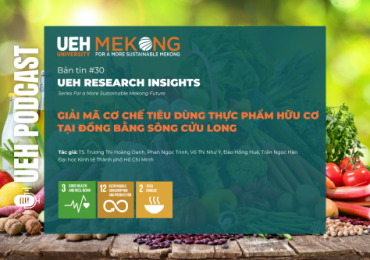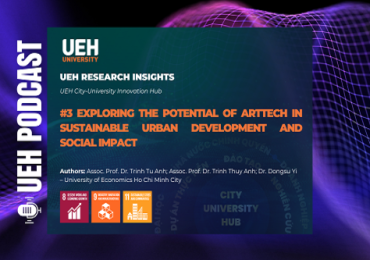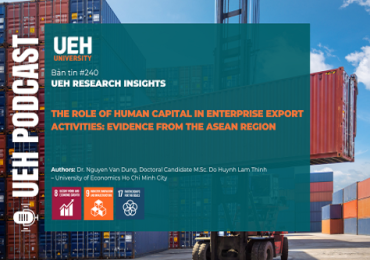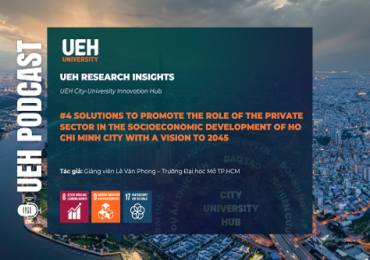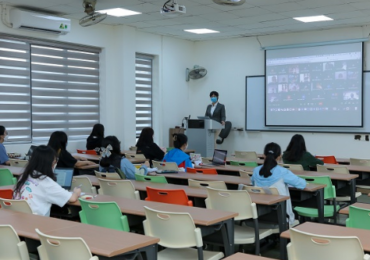[Research Contribution] Promoting Social Insurance Participation for Enterprises in Vinh Long: Relationship with Stakeholders and VssID Application
28 May, 2025
Keywords: Social insurance; Enterprise; Vinh Long; Relationship with stakeholders; VssID application
In the context of social insurance (SI) being an important pillar of social security, the fact that many enterprises have not fully participated in providing for their employees has posed a major challenge to sustainability and social equity. Research by the author group from UEH Mekong, University of Economics Ho Chi Minh City (UEH) has pointed out four main barriers that reduce compliance motivation and contribute to maintaining the non-SI participation status in the business sector: limited awareness of business owners, light level of handling violations, low risk of non-compliance and information asymmetry.
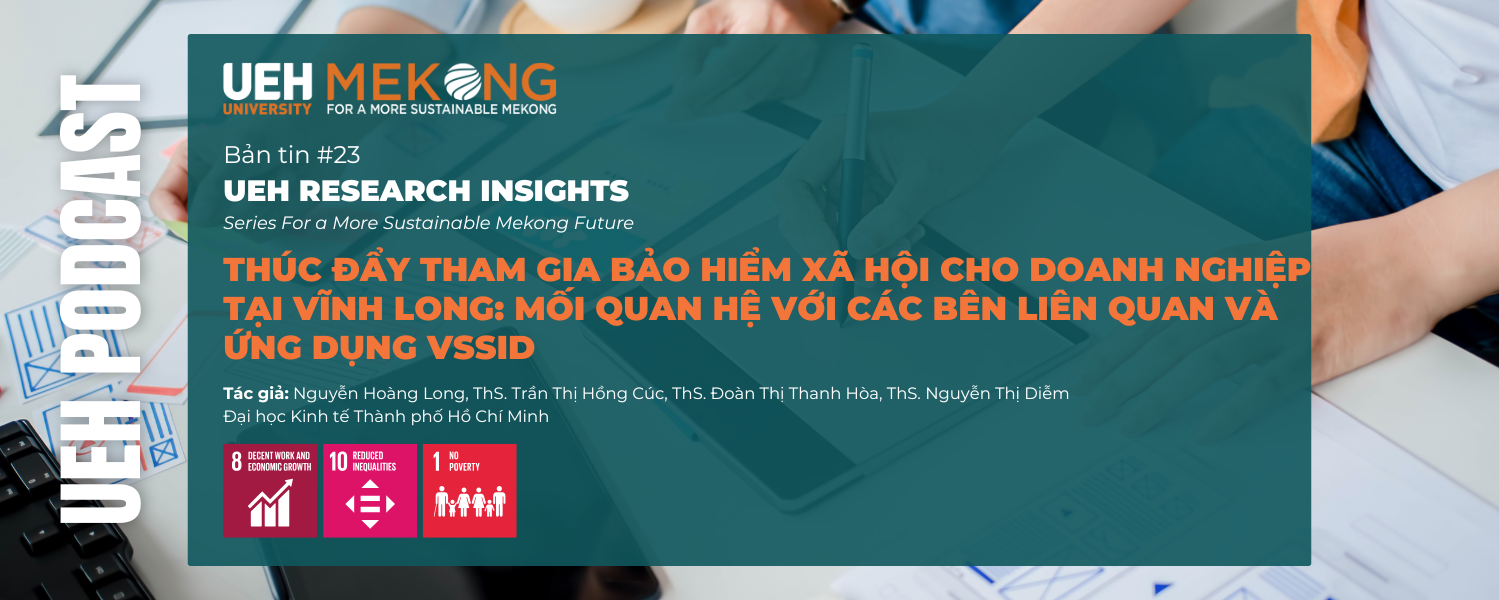
Research context and current status of social insurance participation for employees of enterprises in Vinh Long Province
Social insurance plays an important role in protecting employees from risks. This is not only a legal obligation but also a right and responsibility of enterprises and employees. However, evasion, debt, and misappropriation of social insurance are happening and have become one of the main causes of disputes and lawsuits between employees and enterprises, weakening the social security system, especially the pension system.
As of early 2024, only approximately 30.14% of enterprises in Vinh Long province have registered to participate in social insurance, with the rate of employees participating in compulsory social insurance at 28.88%. These figures reflect a worrying reality regarding the level of compliance with social insurance policies in the business sector. Many enterprises cite business difficulties as reasons to delay or avoid paying social insurance, while employees – because of the limited awareness, fear of losing their jobs or for immediate benefits – often do not proactively request to exercise their legitimate rights.
On that basis, the author group focused on analyzing the factors affecting the behavior of not participating in social insurance for employees of enterprises in Vinh Long province. The research results provide empirical evidence to help social insurance management agencies develop policies to raise awareness of enterprises and employees in complying with the Social Insurance Law.
Factors affecting the behavior of enterprises not participating in social insurance: A quantitative approach
The study by the UEH Mekong authors is based on data on enterprises not participating in social insurance for employees from the social insurance debt management system of the Social Insurance Inspection and Examination Department and the legal information management system of enterprises in Vinh Long province, focusing on qualitative variables that are difficult to measure through secondary data.
The quantitative model results indicate that 07 factors have a significant impact on the non-compliance behavior of enterprises. Specifically, enterprises that have been operating for a long time, have stable cash flow and experience in overcoming economic shocks, often comply with social insurance better. In addition, the relationship of enterprises including good relationships with customers, authorities and suppliers often comply with social insurance to maintain reputation and social responsibility.
In addition, risks, including reputational risks, operating cost risks, inspection and penalty risks, all of which have a deterrent effect, reducing the behavior of avoiding social insurance obligations.
However, the results demonstrate that unfavorable business conditions increase the tendency for enterprises to not participate in social insurance for employees. In particular, information asymmetry between enterprises, social insurance agencies and employees contributes significantly to this behavior. When management agencies and employees do not have enough data on the financial situation of enterprises, especially for small and medium enterprises, business owners can take advantage of information to avoid social insurance obligations.
In addition, business owners’ limited awareness of the role and long-term benefits of social insurance, or the view that the current contribution rate is high and unreasonable, makes them tend to persuade employees, especially those who do not fully understand social insurance benefits, to refuse to participate to receive higher wages in the short term. Finally, the fact that sanctions for violations are not strong enough to deter violations is the reason why non-compliance continues to persist in the business sector.
The indirect impact assessment from the model presents that two factors: relationships with stakeholders and the application of VssID play an important role in limiting non-participation in social insurance. Both of these factors contribute to reducing false perceptions of social insurance, raising awareness of risks, narrowing information asymmetries and increasing awareness of the consequences of violating regulations.
However, the results affirm that enterprises can not participate in social insurance despite having good relationships with stakeholders if they assess the risk of violation being low and hold an information advantage. Similarly, the use of VssID does not ensure compliance if enterprises have limited awareness of social insurance and lack of connection with stakeholders. This means that relationships and support tools are only effective when placed in a comprehensive governance ecosystem and have full awareness from the enterprise side.
Significance of the project and policy implications
Participating in social insurance not only protects the rights of employees but also brings sustainable development to enterprises when fulfilling their social responsibility commitments and building reputation with stakeholders. To promote enterprises to participate in social insurance, the authors suggest three solutions:
First, the insurance agency needs to provide clear guidance on the registration process and penalties, making it easier for businesses to accept and comply. It should be emphasized that the act of not participating in social insurance not only entails penalty costs but also poses risks to the reputation and prestige of the business.
Second, inspection and examination activities should be strengthened, both periodically and suddenly. The selection of inspection samples should be based on the history of social insurance payment and the characteristics of the enterprise like poor business situation, short-term operation of the enterprise or the number of employees not using VssID. When detecting violations, the insurance agency needs to apply appropriate handling measures such as administrative sanctions or publicizing the social insurance debt status on the social insurance information portal and the enterprise’s homepage to increase the risk of being detected and the deterrence when being handled.
Third, communication regarding the role of the VssID application – Social Insurance number needs to be promoted as an effective human resource management tool. The application will help to look up information and allow employees to monitor the social insurance payment of the enterprise, contributing to information transparency and limiting debt and evasion.
In general, the research results are a scientific basis in theory and practice for managers to have a more comprehensive and in-depth view of the factors affecting the behavior of not participating in social insurance for employees of enterprises in Vinh Long Province, encouraging social insurance management agencies to develop policies to raise awareness of enterprises and employees in complying with the Social Insurance Law.
The full-text research article on Promoting social insurance participation for enterprises in Vinh Long: Relationships with stakeholders and VSSID application can be accessed HERE.
Authors: Nguyen Hoang Long, Tran Thi Hong Cuc, Doan Thi Thanh Hoa, Nguyen Thi Diem – University of Economics Ho Chi Minh City (UEH)
This article is part of a series spreading research and applied knowledge with the message “For a More Sustainable Mekong”, part of the program “Research Contribution For All – Research for the Community” implemented by UEH. UEH cordially invites readers to the next UEH Research Insights newsletter.
News and photos: Author, UEH Mekong Department of Admissions and Communications, UEH Department of Communications and Partnerships
Audio: Thanh Kieu

[Podcast] Recommendations for University education development
14 February, 2025
[Podcast] Developing Vung Tau into a World-Class Tourism City
16 January, 2025
[Podcast] Postdigital Design Strategies for Media Art
6 January, 2025
[Podcast] NFTs – Artistic Innovation or Just a New Hype?
27 December, 2024
[Podcast] Boosting Employee Creativity with Constructive Feedback
23 November, 2024
[Podcast] “Dutch Disease” in Remittances and the Case of Vietnam
4 November, 2024
[Podcast] Latest approaches for sustainable universities
11 July, 2024
Data Law – Part 1: Necessity for a New Approach
18 May, 2024
Advertising Evaluation on Tiktok Platform
14 May, 2024
[Podcast] Advertising Evaluation on Tiktok Platform
13 May, 2024
Promoting Learner Autonomy in English Language Learning (Part 1)
24 November, 2023
ArtTech And Sustainable Development
27 October, 2023
Motivation of EFL Vietnamese Students in Economics-related Majors
12 October, 2023
Climate Change And Our Society: The Urgency Of Gender Inequality
12 October, 2023
People Analytics in Vietnam
10 March, 2022
Revolution in Experimental Economics
30 January, 2022
The Sharing Economy: Governance Issues in Vietnam
24 January, 2022
Employment Policy For Ho Chi Minh City in Post-social distancing Period
28 December, 2021
Lifelong learning at UEH: Towards a Sustainable University
28 December, 2021
Building a Decentralized Stock Market based on Blockchain Technology
24 December, 2021
Consumer price index from big data mining perspective (Big data)
17 November, 2021
Overview Of Digital Currency – Part 5: DIEM Private Stabilized Currency
11 November, 2021






